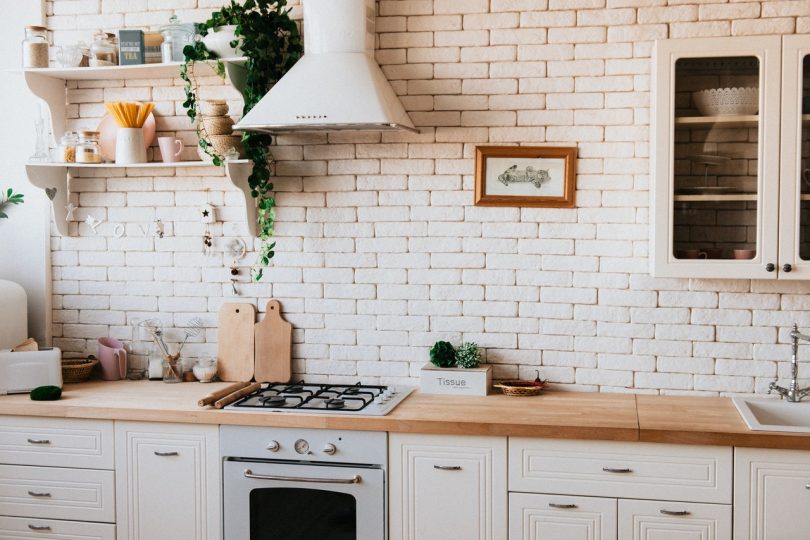The base of every kitchen is the worktop. This is where a lot of emphasis is placed
when choosing the right material. It is subject to the greatest wear and tear and is the most stressed and, with the exception of appliances, the most used element of the kitchen. Among other things, it is also a significant financial item within the kitchen assembly.
Wood is a classic for a reason. Natural wood, with its warm tones, can create a cosy and homely feeling in the kitchen. Each piece of natural wood is totally unique, and when done right, wooden kitchen worktops give the space a real sense of authenticity, individuality, and charm!
When thinking about worktops, you need to be careful about the type of wood you will use – you can’t just use anything. Generally, oak and beech have proven to be the most suitable because of their hardiness. Also interesting is teak, which has the great advantage of being non-absorbent. Unfortunately, beech and oak will need treating first before you can start using them as they are quite absorbent. Coat their surface with varnish, oil or wax. The protective coating also needs to be repeated regularly. Another option could be bamboo. A relatively sustainable crop thanks to its quick growth, it’s also both strong and naturally water resistant.
Finishing the worktops
Solid worktops must be finished to withstand the wear and tear of kitchen use. Generally, wood is always treated with a natural oil that is penetrated deep into the surface to prevent swelling and damage. It also gives the wood resistance to water, mold and wood-boring pests. It is also advisable to regularly re-apply oil yourself during the first 6 weeks after worktop installation. After then, you should then re-oil your worktop every 3 months to ensure the surface remains resilient and hydrophobic.
Another way the wood is treated is by a process called thermization. This is a process in which the wood is heated to 160-220 °C and undergoes a kind of caramelisation, if you will! What this means is the colour of the wood changes from a light brown to dark. The surface is then re-coated with natural oil containing nanosilver. A darker tint throughout the cross-section is obtained by fuming the solid board, which means that it’s treated by ammonia.
How to treat solid wood
Wood is not a material that is totally impervious to damage. It’s a natural material, at the end of the day, so you should always remember to use a chopping board – even if you think the board is the same as the worktop! If the surface of your worktop ever comes into contact with something acidic like fruit juice, or any kitchen chemicals or abrasive cleaners, it needs to be removed immediately from the worktop. However, if you have failed to keep your solid countertop from being damaged, you need not despair. The worktop can be sanded down, surface-treated and made as good as new. On the other hand, regular and gradual wear and tear can look quite nice, tells the story of your kitchen exploits, and adds to the uniqueness of the wooden surface!
What else to consider?
Solid wood worktops are often replaced by laminate, or other man made materials. Although wood as a material is beautiful, the deciding factor for some home owners is often its perceived lack of hygienic properties when compared to harder surfaces like plastic – however this isn’t the case!
Wood is constantly changing its shape and volume. When humidity increases, pores that form on wooden surfaces and moisture, including bacteria and microbes, are sucked in. When the wood dries, the pores close and the bacteria are isolated beneath the surface and destroyed. With a smooth worktop surface, visible dirt is easily removed, but invisible microorganisms remain on the surface and are given the opportunity to multiply. So – unless you clean your worktops like a surgeon – wood is actually very hygienic!
What about price points? Well, the price of worktops can vary. The decisive parameters are the type of wood, the finish, the thickness, the quality of the wood, as well as the installation or space – if you have curved edges, awkward walls or something else that requires custom fitting, the price can go up somewhat. Large singular pieces of timber that are carved out to custom fit a space can reach tens of thousands of pounds – so be aware of what you’re getting into!









